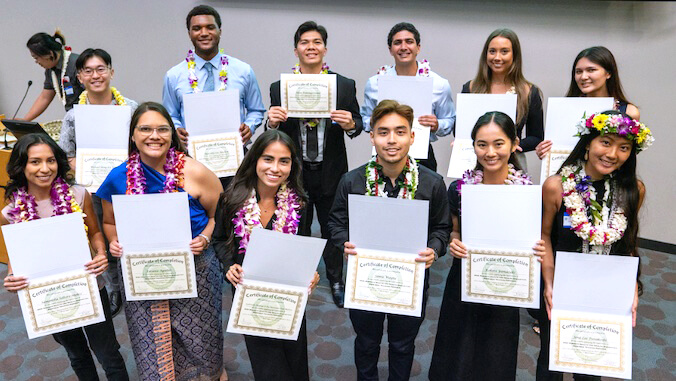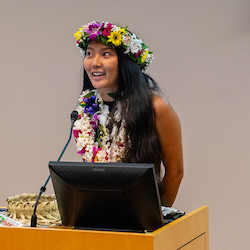
Enrollment in the Minority Health Research Training (MHRT) program at the John A. Burns School of Medicine (JABSOM) at the University of Hawaiʻi at Mānoa has doubled since global travel restrictions were lifted, growing from six students in 2023 to 12 this past academic year. These 12 students presented their study abroad research at the program’s 11th E Hoʻoulu Haumana on August 15.

Since 2014, this National Institutes of Health-funded program offers undergraduate, post-baccalaureate and graduate students from any discipline opportunities to engage in national or international mentored research projects in fields such as tropical medicine, infectious diseases and community research.
This year, students spent eight to nine weeks conducting research in locations such as Thailand, American Samoa, Guam, and Atlanta, Georgia, directly impacting the communities they served. The MHRT program spans one academic year and concludes with students presenting their research from these out-of-state experiences.
“I am incredibly grateful for the opportunity to participate in the MHRT program,” said Jena Funakoshi, who is concurrently pursuing her master’s and PhD in public health. “It has opened numerous doors for research and networking opportunities. My experience in American Samoa taught me invaluable lessons, allowed me to build relationships that will support me throughout my PhD program, and gave me the chance to learn from a new community and experience a beautiful culture.”
“The students are exposed to hot topics in their area, and sometimes, we’re seeing global concerns, like long COVID and Alzheimer’s dementia,” said Angela Sy, MHRT program director. MHRT also emphasizes the cultural aspects of these regions. “The hope is that this contextualizes life in the places where they’re working,” she added.
Many students advance to grad, med school
MHRT has a strong track record of students advancing to graduate school. About 25% go on to medical school, with many continuing at JABSOM. A large portion of those who don’t pursue medical school go on to earn their master’s or PhD.
Applications for the 12th year of MHRT begin in November. The program is open to students from any major, particularly those underrepresented in research.
“We don’t just look at academics; we seek qualities that will help students succeed in applying for future graduate or professional schools,” Sy said.

